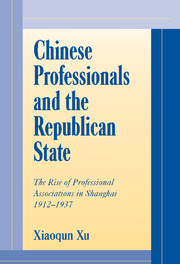 Chinese Professionals and the Republican State
Chinese Professionals and the Republican State Book contents
- Frontmatter
- Contents
- List of Tables
- Acknowledgments
- Abbreviations of Frequently Cited Sources
- Introduction
- Part I Professions and Professionals
- 1 Professions in Early-Twentieth-Century Shanghai
- 2 Professionals as Urban Middle Class
- Conclusion to Part I
- Part II Social Institutions, State Actions, and Professionalization
- Part III Professionalism, Nationalism, and Politics
- Conclusion
- Glossary
- Bibliography
- Index
1 - Professions in Early-Twentieth-Century Shanghai
Published online by Cambridge University Press: 07 September 2009
- Frontmatter
- Contents
- List of Tables
- Acknowledgments
- Abbreviations of Frequently Cited Sources
- Introduction
- Part I Professions and Professionals
- 1 Professions in Early-Twentieth-Century Shanghai
- 2 Professionals as Urban Middle Class
- Conclusion to Part I
- Part II Social Institutions, State Actions, and Professionalization
- Part III Professionalism, Nationalism, and Politics
- Conclusion
- Glossary
- Bibliography
- Index
Summary
ALTHOUGH this book focuses on such professionals as lawyers, doctors, and journalists, the following historical survey includes a broad sketch of modern sectors of urban economy in Shanghai and new occupations associated with them. This sketch will link the growth of the legal, medical, and journalistic professions with the societywide economic transformation – a material foundation upon which the institutions related to law, medicine, and journalism were established. It will also show the economic, social, and cultural connections between the three professions and other professional or occupational groups that, though not ziyou zhiye zhe, could be included in the urban middle class, thus providing a wider backdrop to situate the professional groups in whom the study is most interested.
MODERN SECTORS OF SHANGHAI'S ECONOMY
Commerce
The city of Shanghai emerged from obscurity at the mouth of the Yangzi River primarily as a center of commerce. As early as the Song dynasty the commercial tax collected in Huating County – what was to become part of modern Shanghai – had exceeded the commercial tax collected in Suzhou, in addition to the wine and salt taxes that the government received from the area.
To a large degree Shanghai owed its growing prosperity to the booming trade carried on by maritime and riverine transportation.
- Type
- Chapter
- Information
- Chinese Professionals and the Republican StateThe Rise of Professional Associations in Shanghai, 1912–1937, pp. 23 - 49Publisher: Cambridge University PressPrint publication year: 2000


